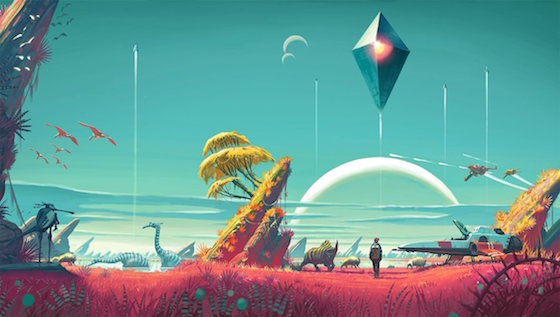A De Montfort University Leicester (DMU) academic is helping online archaeologists to excavate the biggest galaxy ever created.

Dr Catherine Flick, of DMU’s Centre for Computing and Social Responsibility, is creating the ethical framework for the team working on No Man’s Sky Archaeological Survey, taking place in one of the most eagerly-awaited space games for years.
No Man’s Sky, which is released tomorrow (10 August), is a massively-multi-player exploration game which sees players become starship pilots exploring a universe so large that it will have more than 18 quintillion planets – or 18,000,000,000,000,000,000. Each world is generated by a computer algorithm and many have their own machine-created cultures and civilisations.
Gamers can discover new worlds, be the first to meet new civilisations and see geological formations. Along the way they will face threats and collect or trade materials for the journey. People can play in groups or on their own.
The game sparked the interest of archaeologist Andrew Reinhard, who is the pioneer of “archaeogaming”, involving the archaeology of video games and within the online worlds – and what it tells us about culture.
He approached Dr Flick to work with him on setting up the archaeology group No Man’s Sky Archaeological Survey (NMSAS). The team will follow scholarly rules of conduct in setting up methods and processes to document finds and as such recruited Dr Flick to examine the ethical questions raised.

Dr Flick said: “This is a great opportunity to be on the cutting edge of a new interdisciplinary academic field. I’ve never developed a code of ethics for virtual interstellar exploration before, but it’s been an interesting challenge to bring together archaeological, anthropological, software engineering, and Star Trek Prime Directive-style ethical codes together to frame the discussion for how archaeologists of virtual, procedural worlds ought to behave.
"It sounds like it might be a bit frivolous, but developing understandings of how people should behave in virtual worlds could potentially have significant impact given the developments of virtual reality, and, in the future, real space travel. Exploring ethics through science fiction also allows us to reflect on our own behaviour in our more mundane lives, as the issues are often similar, but placed in different contexts.”
Dr Reinhard told Motherboard: “We’re going to be exploring cultures that have never been seen before, never been thought of before.
“We’re going to have to target them, catalogue them, and see if we can come to any universal truths about machine-generated or artificial intelligence-generated cultures and compare those to what we know of here on Earth.”
No Man’s Sky is released by Hello Games in the UK on August 10, available on Playstation 4 and PC, price £49.99.
Posted on Tuesday 9 August 2016